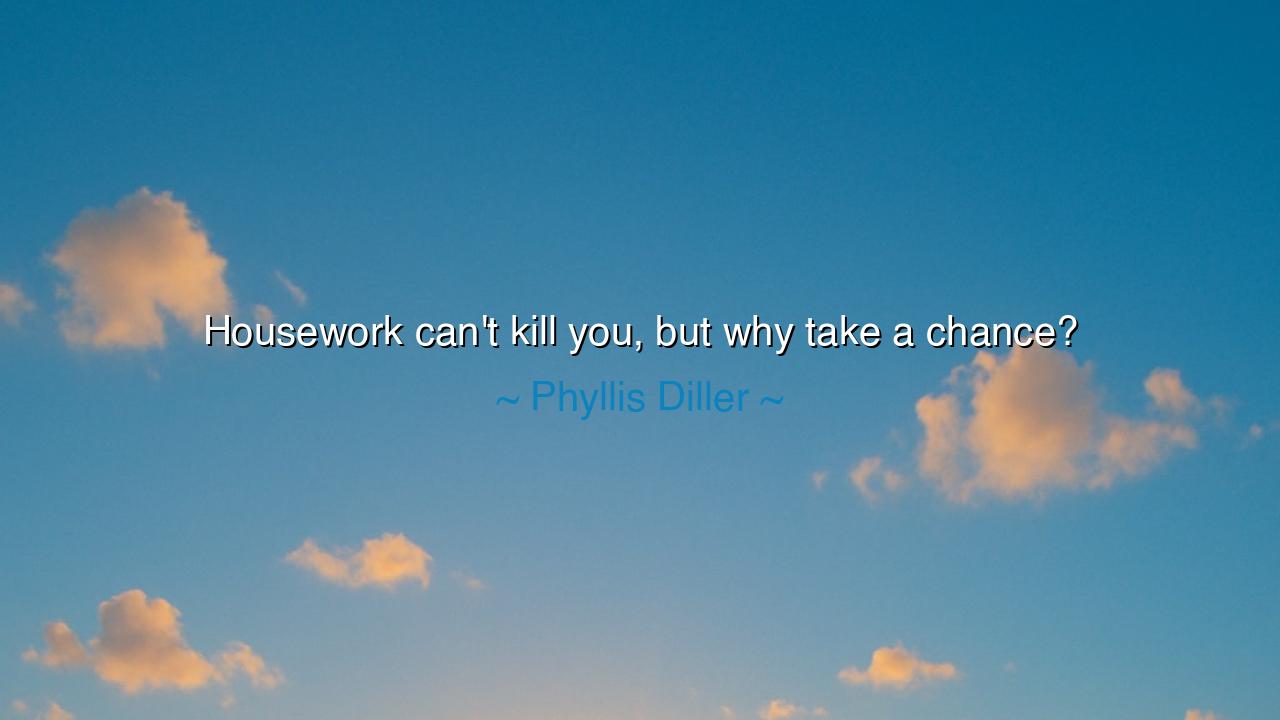
Housework can't kill you, but why take a chance?






Host: The morning sunlight spilled through half-closed blinds, slicing the messy kitchen into bands of gold and shadow. A sink full of dishes caught the light like little mirrors of regret. Somewhere in the background, a washing machine groaned like it was tired of being heroic.
Jack stood barefoot on the cold tiles, shirt rumpled, a coffee mug in one hand and a dishrag in the other. His hair was still wet from a rushed shower, and he looked at the kitchen counter as if it had personally betrayed him.
Across from him, Jeeny sat cross-legged on the counter, wearing an oversized sweater, eating cereal straight from the box. Her eyes twinkled with the lazy defiance of a woman at peace with imperfection.
Host: It was Saturday — the sacred truce between chaos and responsibility — and in this small apartment, domestic warfare was about to resume.
Jeeny: (grinning) “Phyllis Diller once said, ‘Housework can’t kill you, but why take a chance?’”
Jack: (raising his mug) “A toast to wisdom. May the vacuum cleaner never know my touch.”
Jeeny: “You say that like housework’s a wild animal waiting to attack you.”
Jack: “It is. I’ve seen the mop glare at me.”
Jeeny: (laughing) “You’re just allergic to adulthood.”
Jack: “No, I’m allergic to dust — which is adulthood’s cruel joke.”
Host: The sunlight shifted, catching a cloud of flour on the counter, turning it into a kind of domestic stardust. The kitchen looked less like a room and more like a battlefield that had surrendered to laughter.
Jeeny: “You know, Diller was right. Housework’s endless. You clean it today, it mocks you tomorrow.”
Jack: “Exactly! It’s the myth of Sisyphus, but with a Swiffer.”
Jeeny: “Except Sisyphus didn’t have to find matching pillowcases.”
Jack: “Or fold fitted sheets. That’s an existential crisis disguised as linen.”
Jeeny: “You make laziness sound philosophical.”
Jack: “It is philosophical. Refusing to do housework is my quiet rebellion against meaningless repetition.”
Jeeny: “So you’re Camus with a dirty sink.”
Jack: “Exactly. I find meaning in the absurdity of not trying.”
Host: The coffee machine hissed softly behind them, filling the silence with warmth and the scent of caffeine — civilization’s apology for chores.
Jeeny: “But think about it — people act like a spotless house means a happy life. Like dust is moral failure.”
Jack: “That’s capitalism talking. It sold us bleach and called it virtue.”
Jeeny: “So you’re anti-cleanliness now?”
Jack: “No, I’m pro-sanity. You can’t scrub your way to peace.”
Jeeny: “Tell that to my mother. She cleaned through heartbreak.”
Jack: “Then it wasn’t cleaning. It was therapy.”
Jeeny: “Exactly. For some people, order is the only thing they can control.”
Jack: “And for others —” (he gestures around) “— chaos is the only thing that feels honest.”
Host: The refrigerator hummed its slow, steady approval — a metronome to their mismatched philosophies.
Jeeny: “You know, this is why I like Diller. She didn’t just make jokes; she confessed with humor. Housework was her way of saying, ‘Life’s messy. I’ll survive it by laughing first.’”
Jack: “She weaponized wit against drudgery.”
Jeeny: “Exactly. Every joke was resistance wrapped in charm.”
Jack: “And every undone chore was self-care disguised as rebellion.”
Jeeny: “So when she says ‘why take a chance,’ she’s not being lazy — she’s being alive.”
Jack: “Alive enough to choose joy over polish.”
Jeeny: “And imperfection over exhaustion.”
Host: Jeeny slid off the counter, padded over to the sink, and turned on the tap. The sound of running water filled the space, steady and gentle. She rinsed a plate, wiped it, then handed it to Jack.
Jeeny: “Come on. Let’s risk survival.”
Jack: “You mean— do the dishes?”
Jeeny: “Yes, but slowly. Ironically.”
Jack: (grinning) “I’ll allow it if we play jazz and pretend it’s performance art.”
Jeeny: “Deal. You’re Miles Davis with a sponge.”
Host: As the radio clicked on, a soft trumpet filled the air — smooth, melancholic, alive. The two of them moved clumsily but together: washing, drying, teasing. The mundane became choreography.
Jack: “You know, maybe that’s the secret — housework doesn’t kill you, but the obsession with perfection might.”
Jeeny: “Exactly. We’re not cleaning to erase the mess; we’re cleaning to keep it company.”
Jack: “To remind ourselves we live here.”
Jeeny: “And that living isn’t supposed to look spotless.”
Host: The sunlight brightened again, catching droplets of water on the counter, tiny prisms of color. The kitchen, for all its clutter, glowed.
Jeeny: “I think Diller knew the truth — humor keeps you sane when the world demands neatness.”
Jack: “And laughter’s the best disinfectant.”
Jeeny: “Better than bleach.”
Jack: “Cheaper too.”
Host: She tossed the dishrag over his shoulder; he caught it midair. The two of them laughed — real laughter, the kind that fills a room fuller than furniture.
Jack: “You know, this might be the first time I’ve enjoyed housework.”
Jeeny: “That’s because we’re not doing it for the house. We’re doing it for the moment.”
Jack: “For survival, not sparkle.”
Jeeny: “Exactly. Surviving together — one dish at a time.”
Host: The kitchen gleamed now, not with polish, but with presence. The mess had become memory, and the laughter lingered like a perfume of defiance.
And in that small, sunlit room, Phyllis Diller’s words found their truth — not as a joke, but as a philosophy disguised in laughter:
Host: that perfection is overrated, humor is hygiene for the soul,
that housework may not kill you, but obsession might,
and that sometimes the bravest thing you can do
is leave a little dust,
pour another coffee,
and laugh your way through the living.
Host: For life, like a kitchen, is never spotless —
but with the right company,
it’s always alive.






AAdministratorAdministrator
Welcome, honored guests. Please leave a comment, we will respond soon